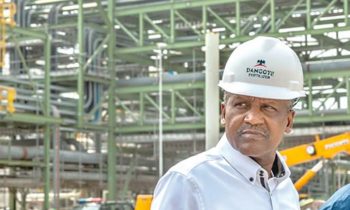
Shell Deutschland (Shell) has reached an agreement with Alcmene GmbH (part of the Liwathon Group) for the sale of its non-operated 37.5% shareholding in the Germany PCK Schwedt Refinery.
The divestment is part of Shell’s strategy to reduce its global refinery footprint to core sites integrated with the company’s trading hubs, chemicals plants and marketing businesses.
“This is yet another milestone in our journey towards a reduced refining portfolio,” said Robin Mooldijk, Shell’s EVP for Manufacturing. “This sale supports the shift of Shell’s refining portfolio which includes the development of the high-value Energy & Chemicals Park Rheinland.”
Germany remains a key country to realise Shell’s powering progress strategy goal of achieving net-zero emissions, purposefully and profitably. This sale does not impact any of Shell’s other interests or activities in the country ading hubs, chemicals plants and marketing businesses..
The transaction is expected to close in the second half of 2021, subject to partner rights and regulatory approval.
Located 120 km Northeast of Berlin, Germany, the PCK refinery currently processes approximately 220,000 barrels of crude oil per day.Shell is divesting its shares in this non-operated venture and, as a result, Shell employees will not be materially impacted as PCK is independently managed.
The other shareholders who have pre-emption rights in the joint venture are: Rosneft 54.17% and Eni 8.33%. The pre-emption rights may be exercised within a period of three months of notification (immediately post signing of the Sale and Purchase Agreement) and will lapse after this timeframe
Liwathon Group is a privately-owned energy holding company. Alcmene GmbH will provide energy and commodities trading from its headquarters in Vienna, Austria
The hydrocarbon inventory will be valued at closing based on actual volumes and prevailing market prices. Assuming current market prices, historic inventory volumes, and normal operating conditions, the current value of the hydrocarbon inventory would range between $150 to $250 million
“In our 2020 Q3 results, we outlined the future of our Chemicals and Refining business. Shell plans to concentrate its refining portfolio to a smaller set of core sites that are integrated with Chemicals and Trading, which we refer to as Energy and Chemical Parks. These locations will integrate the benefits of conventional fuels and chemicals production while also offering new low carbon fuels and performance chemicals. They also offer future potential hubs for sequestration.”
Meanwhile the company has also signed a Memorandum of understanding to accelerate transitions to net zero with a Deutsche Telekom company. It is set to supply renewable energy to T-Mobile US. While Deutsche Telekom engineers are install more than 10,000 electric vehicle chargers in Germany.
The Shell Gas & Power Developments BV (Shell) and T-Systems International GmbH (T-Systems), Deutsche Telekom’s corporate customers arm, have signed a memorandum of understanding (MOU) to advance digital innovation as both companies accelerate their transitions to net-zero emissions.
The MOU builds on an existing technological relationship between Shell and T-Systems. Under the terms of the agreement the two companies will:
- Pursue the net-zero goals of both companies, their supply chains and customers
- Collaborate on innovations and services to accelerate Shell’s digital transformation
- Work together to identify opportunities to co-invest and participate in new business models focused on the decarbonisation of society
To accelerate the transition to net zero, Shell is supplying renewable energy to T-Systems sister company, T-Mobile US, which is working towards a goal of operating on 100% renewable energy by the end of 2021.
In turn, NewMotion and ubitricity, subsidiaries of Shell which provide electric vehicle (EV) charging solutions across Europe, have awarded T-Systems a contract for Deutsche Telekom field engineers to install more than 10,000 EV chargers in Germany over the next three years.
The collaboration on innovations and services, reflected in the renewed global master services agreement entered into between Shell and T-Systems in 2020, will see Shell’s current Dynamic Hosting Services solution replaced with the next version of Private Cloud.
Both companies will also aim to deepen their IT products and service capabilities and explore new areas of digital innovation, including Hybrid and Edge Computing, which are different forms of data storage, as well as 5G connectivity. Shell has also installed immersion cooling technology for greater computing and energy efficiency in one of the T-Systems data centres in Amsterdam, the Netherlands.
Deutsche Telekom and Shell are also exploring the viability of smart city solutions, aimed at helping cities decarbonise and providing aggregated city data. For example, “Citykey”, which could deliver EV-charging and mobility data on an easy-to-use app. The two companies are also exploring the potential of smart lighting projects with streetlight-based EV-charging possibilities.
“We are delighted to deepen our relationship with Deutsche Telekom and help the company to pursue its net-zero pledge while progressing our own target to be a net-zero emissions energy business by 2050, in step with society,” said Elisabeth Brinton, Executive Vice President Renewables & Energy Solutions at Shell. “Getting society to net zero will require unprecedented levels of collaboration.”
Adel Al-Saleh, Deutsche Telekom board member and CEO of T-Systems, said: “We are committed to acting responsibly along our entire value chain and working together with our clients is pivotal in this. No individual and no company can solve the climate challenge alone. This is why we have put sustainability at the core of our strategy as we aim to become the leading European full IT-service provider. This newly signed MOU allows Shell and Deutsche Telekom to leverage their long-term collaboration, teaming up in new areas that will benefit society.”





